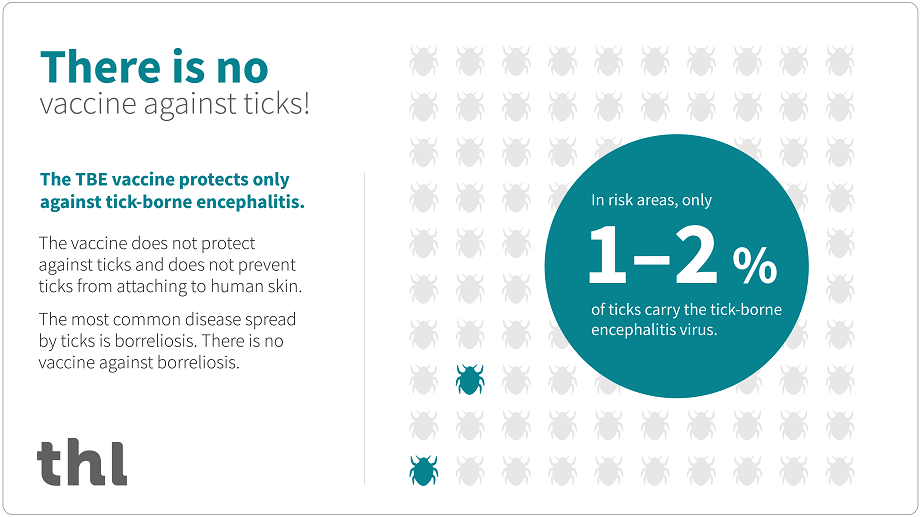Slight decrease in cases of tick-borne encephalitis in 2022 – national vaccination programme expands to Suvisaaristo in Espoo

In 2022, a total of 123 cases of tick-borne encephalitis were reported to THL’s Infectious Diseases Register, which is slightly less than in the peak year of 2021 when there were 148 cases. There have been fewer than 100 cases in previous years.
“There has been a rising trend in the number of reported TBE cases for over ten years. This can be explained by a number of factors. For example, climate change and people’s awareness of tick-borne diseases can partly explain the increase in the number of cases,” says Henna Mäkelä, Researcher at THL.
Based on the monitoring data from the period 2018–2022, the incidence of tick-borne encephalitis has been highest in coastal municipalities, more specifically in Pargas (46 cases per 100,000 inhabitants), Kustavi (41 / 100,000), the province of Åland (38 / 100,000) and Lohja (16 / 100,000). Almost all of the infections have been diagnosed in persons who did not have protection from vaccinations. It is important to ensure protection from vaccinations especially when living in an area included in the national vaccination programme.
New area from the Espoo archipelago included in the vaccination programme
This year, the national vaccination programme for tick-borne encephalitis will expand to Suvisaaristo in Espoo. There has been a significant increase in the incidence of the disease in this area during the five years of monitoring.
“THL monitors the occurrence of tick-borne encephalitis by municipality. However, the cases are often limited to small geographical areas, so we also utilise incidence rates specific to postal code areas in our recommendations,” Mäkelä explains.
In addition to Suvisaaristo, TBE vaccinations will continue in Åland, Pargas, Simo, the southern parts of Kemi, the Kotka archipelago, the Sammonlahti district of Lappeenranta, the island of Preiskari near Raahe, Kustavi, the Sipoo archipelago, the Ojamo, Lylyinen/Hormajärvi, Vohloinen/Virkkala and Kirkniemi postal code areas in Lohja and the Luoma and Masala postal code areas in Kirkkonummi.
Vaccinations under the national vaccination programme are free of charge and are available to all permanent residents and long-term vacationers aged three or over in the area. The more a person spends time and moves around in nature during the summer, the more necessary the vaccine is for them. The vaccination series includes three vaccine doses. The vaccination series should be started no later than at the beginning of spring so that two vaccine doses can be administered before the summer. The third vaccine dose will be administered the following year.
TBE vaccinations under the national vaccination programme are only administered in wellbeing services counties that have areas included in the vaccination programme. The wellbeing services counties will inform residents on how vaccinations are organised.
Vaccination recommendations in other risk areas are also updated
THL is also issuing vaccination recommendations for areas outside the national vaccination programme. The vaccination recommendations for these risk areas are based on incidence and case-by-case consideration. Many municipalities around archipelagos and along the coast in particular are risk areas of tick-borne encephalitis.
This year, vaccination recommendations for risk areas have been updated in Espoo, Hanko, Joensuu, Puumala, Raasepori, Rauma and Uusikaupunki. In risk areas for which vaccination recommendations have been issued, people must pay for their vaccination series themselves.
You can see the number of cases and the TBE vaccination recommendations for each municipality in the map application available on the THL website (in Finnish).
Protect yourself against tick bites
The TBE vaccine protects only against the tick-borne encephalitis caused by a virus. The vaccine does not protect against other diseases transmitted by ticks, such as borreliosis, and does not prevent ticks from attaching to the skin. All diseases spread by ticks can be prevented by protecting oneself against tick bites.
“When spending time in the nature in areas where ticks are present, it is a good idea to wear light-coloured clothes with long sleeves and put one’s socks over the trouser legs. An insect repellent that works on ticks can provide additional protection, as can daily tick inspections. However, fear of tick-borne diseases is not a good reason to restrict your activities in nature. The health benefits of outdoor recreation are much greater than the risks caused by ticks,” Mäkelä points out.
Additional information
Map presentation of the incidence of tick-borne encephalitis and vaccination recommendations by municipality
(THL, in Finnish)
What is tick-borne encephalitis?
(THL, in Finnish)
TBE vaccine
(THL)
TBE vaccinations outside the vaccination programme
(THL, in Finnish)
The difference between tick-borne encephalitis and borreliosis
(THL blog, 16 March 2021, in Finnish)
Henna Mäkelä
Researcher
THL
tel. +358 (0)29 524 7488
[email protected]
Mika Muhonen (vaccinations)
Medical Specialist
THL
tel. +358 (0)29 524 7897
[email protected]



